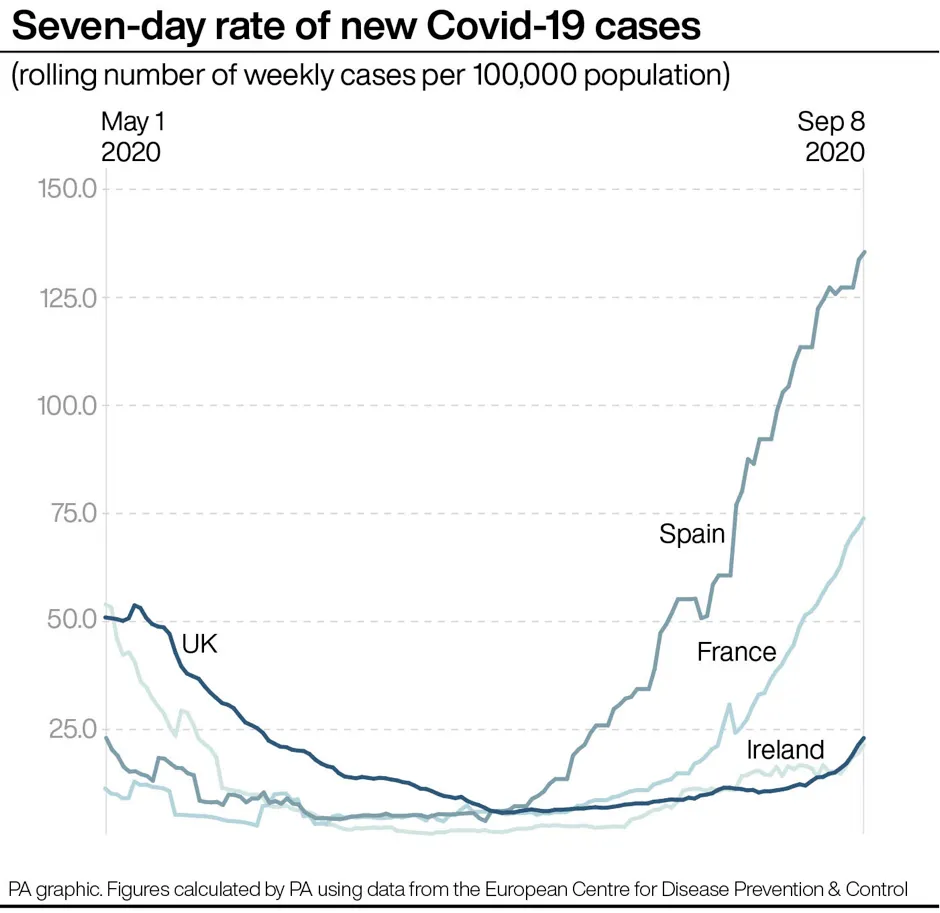The coming weeks will be “critical” in containing the spread of coronavirus in the UK, an expert has said.
Professor Sir Jeremy Farrar warned that the country was not through the COVID-19 pandemic, and that community transmission is going to increase in the weeks to come.
The Wellcome Trust director and Sage member believes the UK is two to four weeks behind Europe, as it has been since the beginning of the outbreak.
More expert comments on coronavirus:
- This is not the beginning of a second wave – we're still trying to end the first, says expert
- Coronavirus not “going to be a disease like smallpox which could be eradicated by vaccination”
- Evidence that the COVID-19 virus existed in March 2019 would be ‘highly surprising’ says expert
Speaking at a Wellcome media briefing, he said: “I think that community transmission is going to increase over the coming weeks.
“And with that this new phase, the next six weeks are going to be absolutely critical.
“And the really important question is whether we can contain the community transmission, which will increase.”
Dr Farrar explained that the real concern lay in transmission spreading to the more vulnerable parts of the population.
He added: “Yes the elderly, people from BAME backgrounds and whether it’s allowed to get into hospital transmission and indeed into care homes. That’s got to be the focus.

“The community transmission will go on. It’s whether we can prevent that coming across into other more vulnerable populations in the future.
“And nobody should be under an illusion this infection is going away – this is now a human endemic infection.”
Dr Farrar said social distancing, hand-washing, and wearing masks were very important, but they were not an exit strategy.
He explained that an exit strategy would come via the ability to change the fundamentals of the virus – the transmission of the virus, the severity of illness that it causes, the ability to diagnose it, test it, and quarantine with non-pharmacological interventions, as well as treatments and vaccines.

Talking about the global race to develop a COVID-19 vaccine, Dr Farrar said there was “no value” in vaccine nationalism.
“It won’t speed things up,” he said. “In fact it’ll slow things down. And we have no idea where the best vaccine that is safe and effective will come from.
“But wherever it comes from, the world will need it, and multiple vaccines, so working together is absolutely critical.”
Dr Farrar said he was optimistic a vaccine would be developed, maybe by the latter stages of this year, but “certainly” into 2021.
Read more about vaccine research:
- Oxford coronavirus vaccine: Why have trials paused?
- New measures could give a COVID-19 vaccine 'temporary authorisation for use'
- Cambridge vaccine gets £1.9 million to begin clinical trials
“Science is still moving at an incredible pace. I remain optimistic about the pace of progress. However, the reality today is we remain some way off the range of vaccines and treatments we need,” said Dr Farrar.
“We must be clear; the first vaccines will not be perfect – and they should only be offered first to the 20-30 per cent of the population who are most at risk, including healthcare workers.
“Vaccines will allow us to make small steps to return to a sense of normality, but will not be, on their own a magic or instant end to the pandemic. That can only come with nations, rich and poor, working together in the global, not national, long-term interest.”
Q&A: How can I protect myself from the coronavirus when shopping?
You’ll have seen signs in your local supermarket advising you to keep two metres from others while moving around the store. This is key to reducing your chances of catching the virus while shopping.
The coronavirus SARS-CoV-2 is spread through respiratory droplets that leave our mouth and nose when we cough, sneeze, or sometimes even talk. The droplets sprayed out by an infected person will contain the virus, which could then enter your body via your mouth, nose or eyes (this is why you shouldn’t be touching your face).
Respiratory droplets don’t usually travel more than one metre, so by keeping two metres from others, you’ll reduce the likelihood of being in the firing line. To make it easier to keep your distance, try to shop during off-peak hours, choose a store that’s limiting the number of people who can be inside at any one time, and use self-checkout if you can.
Keeping your hands clean is the other main thing you can do. If possible, wipe the trolley or basket handles with a disinfectant wipe when you arrive at the store. When you get home, wash your hands or use hand sanitiser before and after unpacking your bags.
A US study found that the coronavirus can survive for up to 24 hours on cardboard, and up to three days on hard, shiny surfaces such as plastic, so wiping down your purchases with a disinfectant spray or a soapy cloth before you put them away is another good habit to get into.
Read more:
